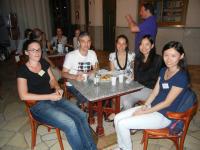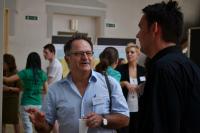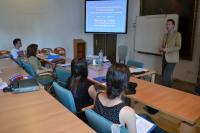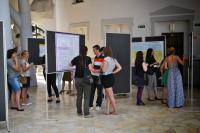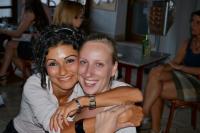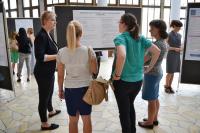29th August, Monday
| 12:00-20:00 | Registration |
30th August, Tuesday
| 8:30-9:30 | Registration and coffee |
| 9:30-9:35 | Conference opening |
| 9:35-10:30 | Invited speaker: Prof. Caroline Féry(Goethe-Universität Frankfurt)Reflexes of information structure in the syntax-prosody interface: prominence and alignment |
| 10:30-11:05 | Fabian Schubö(Goethe-Universität Frankfurt, Linguistics Department)Recursion in German intonation phrase structure |
| 11:05-11:40 | Lena Ibnbari(Ben Gurion University of the Negev, Beer Sheva)Russian gerundive gaps as topic drop |
| 11:40-11:55 | coffee break |
| 11:55-12:30 | Sharon Taube(Ben Gurion University of the Negev, Beer Sheva, Dept. of Foreign Literature & Linguistics)The mystery of the missing argument: Hebrew object drop |
| 12:30-13:05 | Ali Algryani(Newcastle University)VP ellipsis in Libyan Arabic |
| 13:05-14:30 | LUNCH |
| 14:30-15:05 | Regula Sutter(Eötvös Loránd University, Budapest, Department of Theoretical Linguistics)Umlaut is not phonological in Swiss German |
| 15:05-15:40 | Lilla Magyar(Eötvös Loránd University, Budapest, Department of Theoretical Linguistics)Vowel ~ zero alternations in Hungarian nominal inflectional and derivational paradigms: An analogy-based statistical approach |
| 15:40-16:15 | Tomislav Socanac(Geneva University, Department of Linguistics)Subjunctive in Serbo-Croatian |
| 16:15-16:50 | Adrienn Jánosi(Hogeschool-Universiteit Brussel, Center for Research in Syntax, Semantics and Phonology)Long-distance split focalization in Hungarian: movement or base-generation? |
| 16:50-17:00 | coffee break |
| 17:00-18:00 | Poster Session (see the list of the presentations below) |
| 18:30 | Conference reception (buffet style) |
31th August, Wednesday
| 8:30-9:30 | Registration and coffee |
| 9:30-10:05 | Enikő Tankó(University of Bucharest, Faculty of Languages and Literatures)Empirical evidence on the acquisition of the English passive construction by L1 speakers of Hungarian |
| 10:05-10:40 | Ismet Adnan Ozturel – Orkan Ozcan(Middle East Technical University, Ankara, Cognitive Science Department)Collective learning of an emergent vocabulary: naming game with reinforcement learning |
| 10:40-11:15 | Ágoston Nagy(University of Szeged, Department of French Studies)Contrasting French nominal terms to common language NPs – towards a rule-based term extractor |
| 11:15-11:30 | coffee break |
| 11:30-12:05 | Zsuzsanna Németh (University of Szeged, Faculty of Arts, Graduate School in Linguistics, Theoretical Ling.) Recycle and replacement repairs as same turn self-repair strategies in Hungarian |
| 12:05-12:40 | Georg Höhn (University of Potsdam, Department of Linguistics) The licensing of adnominal PPs: The case of Basque –ko |
| 12:40-13:15 | Daniela Henze – Eva Zimmermann(University of Leipzig, Department of Linguistics)Cyclic feature deletion |
| 13:15-14:15 | LUNCH |
| 14:15-14:50 | Tamás Halm(Pázmány Péter Catholic University, Doctoral School in Linguistics)Unergative and/or unaccusative: the argument structure, semantics and syntax of semelfactives in Hungarian |
| 14:50-15:25 | Adina Camelia Bleotu(Ca’ Foscari, Venezia, Linguistics)Why does IT always rain on me? |
| 15:25-16:00 | Nicola Varchetta(University of Venice)Italian psychological verbs, a fine grained analysis of the VP |
| 16:00-16:10 | coffee break |
| 16:10-16:45 | Hana Strachoňová(Masaryk University Brno, Department of Linguistics and Baltic Languages)Czech temporal adjuncts |
| 16:45-17:20 | Mihaela Zamfirescu(University of Bucharest, English Department of the Faculty of Foreign Languages)Lexical positive polarity items in Romanian |
| 17:20-18:15 | Invited speaker: Prof. Katalin É. Kiss(Pázmány Péter Catholic University)Differential object−verb agreement is (fossilized) topic−verb agreement |
| Conference closing |
Poster presentations:
Adam Szalontai (Eötvös Loránd University, Budapest, Dept. of Theoretical Linguistics)
Dative constructions and Scrambling in Hungarian
Ákos Bodányi (Pázmány Péter Catholic University, Doctoral School in Linguistics)
The coordinating conjunctions in Hungarian
Aleksandra Biela-Wolonciej (University of Warsaw, Institute of Applied Linguistics)
András Bárány (University of Vienna, Department of Finno-Ugric Studies)
Differential object marking and Hungarian Object Agreement
Andrea Bellavia (Universitat Autònoma de Barcelona, Centre de Lingüística Teòrica)
Profiling no Endpoint: Detelicization Processes in Idiomatic Constructions
Arianna Kitzinger (Pázmány Péter Catholic University, Doctoral School in Linguistics)
Linguistic Challenges in a Hungarian Multilingual and Multicultural Kindergarten
Elena Galkina (Herzen State Pedagogical University of Russia, Department of Child Speech, Saint-Petersburg, Russia)
Lexico-grammatical development of an early-aged child: case study
Igor Vinogradov (Moscow State University, Department of Theoretical and Applied Linguistics)
Modality in the Grammar of Modern Mayan Languages
Júlia Keresztes (Pázmány Péter Catholic University, English Department)
Hungarian object-drop as noun phrase ellipsis
Mateusz Bialas (University of Warsaw, Institute of Applied Linguistics)
Nicolas Sarkozy – a French celebrity macho man who fell from favour a long time ago?
Mohamed Jlassi (School of English Literature, Language and Linguistics, University of Newcastle)
Subject positions in Arabic once more: evidence from doubling constructions
Natalia Cherepovskaya (Department of General Linguistics, Saint-Petersburg State University)
Comprehension of Conventional and Salient Metaphors: Russian Evidence from Self-Paced Reading Task
Orsolya Tánczos (Pázmány Péter Catholic University, Doctoral School in Linguistics)
Single Predicate Causatives in the Udmurt Language
Sandra Iulia Ronai (University of Bucharest)
Negation and (lack of) DO-support in a case of pseudo-archaic English
Sebők Szilárd (Comenius University, Bratislava)
Language Ideologies in Hungarian Prescriptive Linguistics
Sofia Krasnoshchekova (Saint-Peterburg State University, Department of Philology)
Acquisition of Demonstratives by a Russian-Speaking Child
Tatjana Struna Berden (University of Ljubljana, Faculty of Arts)
Pronouns expression of quantity: French plusieurs, certains, quelques and their Slovene equivalents
Recommended program: The 4th Syntax, Phonology and Language Analysis conference (SinFonIJA 4) will take place at the Research Institute for Linguistics of the Hungarian Academy of Sciences, in Budapest, on 1-3 September, 2011, just after CECIL’s.



